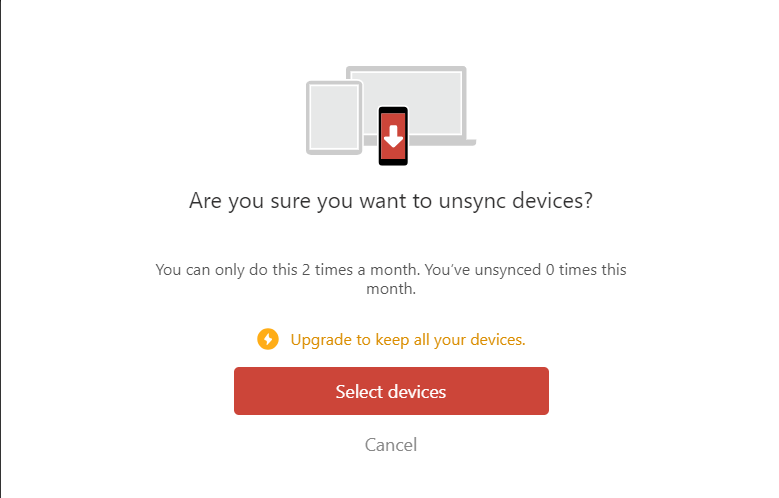Its acquirer (Bending Spoons) has taken over operations. They’ve also hiked subscriptions prices and told customers they intend to use new revenues to pay for new features. How they intend to do that without any staff is something I would like to know about.
If you’re still using Evernote, probably a good time to stop.
And this is why closed platforms suck, particularly for long-term knowledge.
Don’t worry, obsidian.md is here for you.
While I agree, and use Obsidian.md myself, it’s worth bearing in mind that Obsidian is also closed source and could pull the same shenanigans.
The data structures are completely open, though, and that’s enough for me. I can crack open my vault in VS code and navigate my info easily.
It’s a great time to give Recollectr a try!
Recollectr was inspired by prior projects like Notational Velocity but aims to be a lot more - omnibox, markdown support, reminders - and for paid users revisions, note-linking, and sync.
(Disclaimer: See account name)
User name checked out, proceed.
And this is why for something simple like this, I say self hosting is the only option. I’m sure their software is great. But it’s the sort of thing where a subscription fee is not necessary. If it’s the sort of thing that conceptually can be run on a raspberry pi and use less than 1% of that little CPU, it’s not something I want to pay every month for.
If it’s the sort of thing that conceptually can be run on a raspberry pi and use less than 1% of that little CPU, it’s not something I want to pay every month for.
OOT, is Raspi really capable of self-hosting, and is running things like this really that lightweight?
People self-host all kinds of things on Raspberry Pis, from web and other servers to home automation hubs. Web serving is extremely cheap in terms of CPU time, even moreso when you’re only hosting for yourself and perhaps family/friends. I wouldn’t recommend running an open web service like a Lemmy instance on a Raspberry Pi, but hosting something like this would have a minimal impact on a Pi. I have a multiple-generations-old Pi 3 which hosts an IRC bouncer, DNS-level ad blocker, Matrix chat bridge, web server and probably more stuff I’ve already forgotten and I can still use it for media playback or retro emulation concurrent to the rest, if the mood strikes.
Nice, thank you for reminding me of a few uses to put my Pi’s to. I had it set up as a Plex server for a long time but it just wasn’t strong enough (rather, too much transcoding even for files that should have direct played). Then between the Steam Deck taking over emulation and my MagicMirror being more visual than informational the Pi’s slowly faded from use.
Now I’ve been wondering how I’m going to self host all these services when my two PC’s already have pretty dedicated uses I don’t want to bog them down with, or force them to be on all the time. And here we are, Pi’s coming back into play!
Let me introduce you to my note-taking setup.
- Create a new folder, and add a note by creating a markdown file or .txt file
- Edit it using Notepad, or even better, Obsidian.md
- Synchronize it using Syncthing (on Windows, you can use SyncTrazor, which is basically a UI for Syncthing), add as many devices as possible
That’s it. You always own your own files, and there’s no more worry about cloud services going down
Thanks for this! Seems like a simple, solid solution.
Obsidian is a solid choice; it’s what I use, except I use the plugin called Livesync that offers a self-hosted syncing solution that is more tightly integrated with obsidian. I could have totally just used SyncThings, since I already have that for syncing other stuff. I just like to tinker with this kind of stuff.
Edited: added context
Thanks for mentioning Livesync! I hadn’t come across that before and it seems perfect for me. I appreciate it!
No problem! It took a little bit of trial and error to get it up and running smoothly, but at the same time the dev seems to be overhauling the UI to make that less necessary.
TIL about Livesync, interesting plugin!
Maybe one day when I have my own server and finally able to self-host something, I will use that.
Well, Bending Spoons seem to be hiring a lot in Spain. Or so my Linkedin notifications would lead me to believe. This makes it even worse if that is the case.
How is that a bad thing? Genuine question.
Laying off tenured employees in high cost locations to get newer people in earning less, and possibly fewer benefits. Bad for morale, knowledge transfer, and it’s a way to erode pay and benefits for employees globally.
Recommendations for alternatives? I’ve been meaning to switch to something else for a long time for my personal notes. Taking a look at obsidian now but interested in shopping around. Self hosted, cross platform and tools for sharing/collaboration desired.
It really depends on what you want: I really like obsidian which is cross-platform and uses basically vanilla markdown which makes it easy to switch should this project go down in flames (there are also plugins that add additional syntax which may not be portable, but that’s as expected).
There’s also logseq which has much more bespoke syntax (major extensions to markdown), but is also OSS meaning there’s no real danger of it suddenly vanishing from one day to the next.
Specifically Logseq is much heavier than obsidian both in the app itself and the features it adds to markdown, while obsidian is much more “markdown++” with a significant part of the “++” coming from plugins.In my experience logseq is really nice for short-term note taking (e.g. lists, reminders, etc) and obsidian is much nicer for long-term notes.
Some people also like notion, but i never got into that: it requires much more structure ahead of time and is very locked down (it also obviously isn’t self-hosted). I can see notion being really nice for people that want less general note-taking and more custom “forms” to fill out (e.g. traveling checklists, production planning, etc…).
Personally, I would always go with obsidian, just for the piece of mind that the markdown plays well with other markdown editors which is important for me if I want a long-running knowledge base.
Unfortunately I cannot tell you anything with regards to collaboration since I do not use that feature in any note-taking systemNotion is so good, but damn, it cannot be used offline I think, that’s a major dealbreaker to me
I only use it to share texts in team environment (college group projects, work, etc)
It sort of has an offline mode (if you already have the page loaded), but expansive offline support is solely needed.
Thank you so much for taking the time to write all this. I’ll be back after work today to do a bit of exploring of these options and the others posted in this thread. Looking forward to spending half the weekend sorting out my notes now!
Adding another +1 for Obsidian. I’ve tried a whole lot of note-taking apps over the years and Obsidian is the best I’ve ever used by a pretty significant margin.
That said, there’s one caveat to note about self-hosting: if you’re on iOS, there’s not much of an option for syncing besides their paid Obsidian Sync service. I think there are some hacky workarounds for this, but they don’t seem great.
Another option to consider is Joplin. I used it before Obsidian, and while it’s not nearly as slick as Obsidian, it is fully open source, cross-platform, Markdown-based, and supports syncing with a variety of protocols out of the box. I had it set up to sync to a directory on my NAS using WebDAV and it worked reasonably well across all my devices. It also feels more Evernote-like to me than Obsidian and there’s a built-in option to import an ENEX file if you want to move your notes over.
I’m using iCloud for syncing. Works on my iPhone, Mac and Windows PC.
Gotcha. I honestly just paid for Obsidian Sync, so I haven’t really evaluated the other options myself. I just know I’ve seen people mention that it was non-trivial or impossible to set up things like Git or Syncthing for syncing.
I’m probably not a power user, but I don’t see why at least 50% of evernotes’ features can’t be replicated on a simple folder in google drive with a few docs in it.
Ok, I see a lot of people offering suggestions, but ones that seem to mostly apply to single-user situations. All I use Evernote for these days is shared work notes across my organization. I know about Notion, but it’s a bit more complex than I’d like for tracking notes over long periods of time (years of notes coming from a few users, but being visible to many other users who are not technically savvy).
Also, am I missing the link to an actual article, or is it only to the ycombinator post? (I admittedly don’t know much about ycombinator or how it works.)
I’m a pretty big fan of Craft - it has the slight problem a lot of similar types of editors do, where it handles a lot of different content types so the text handling can be weird at times, but overall it has a great interface, supports sharing with non-paid accounts, and generally felt worth paying for for me.
Doesn’t OneNote do shared notes pretty well?
Sigh, I have been an Evernote subscriber since 2008 - this sucks
Strong recommend for Joplin. You can sync with many services that you may already be using or you can self host a sync server.
I also like that Joplin stores copies locally. If I lose internet, I still have it on my phone.
I used Joplin for a while but found that it was a bit too clunky. Also, yes it does store the notes locally, but they weren’t in a plain text format. My notes were fragmented across different files.
I switched to Obsidian after that and will never switch back. Yes, people make Obsidian complicated, but it’s honestly only as complex as you make it.
For me, all it does is text and sync. All the files are stored locally in complete markdown format. That way I can read them in any program that can process text. My personal workspace syncs to an S3 compatible service, while work synced to Google Drive.
I loved Joplin and felt so conflicted when I found Obsidian. But now I would recommend it over Joplin any day.
Fair. The reason why Joplin does it that way is because it holds your note history locally too. If you accidentally delete something you can go back and look at past saves. Pretty convenient but at the cost of not having single file .md notes.
Export (or at least backup) your notes now!
https://www.theverge.com/23462732/evernote-export-notebook-how-to
I use Evernote for 3 general things:
- clip interesting articles I want to read later
- keep track of home inventory & pdf files - i.e. make a note for each big item in my home with picture, serial number, user manual, etc
- longer form notes
For notes I’m going to try Obsidian. I wasn’t too thrilled with how Evernote worked as a note taker, and I like markdown files.
I’m not sure what to do about the other two.no one uses Nextcloud notes?
I just logged onto my Evernote to back everything up due to this news, and this is what I found after I logged on and it pestering me to “unsync” my existing devices (not a bad idea honestly, it’s been literally 6 years since I’ve used Evernote):

That’s right, you can only unsync your devices TWICE A MONTH. If that’s not the absolute trashiest shit behavior, I don’t know what is. Deleting my account once I get my info.
Edit: I have one whole note and I don’t have the equipment it refers to anymore, so say goodbye to my Evernote account. Enshittification goes on.
ColorNote is way better anyway.















